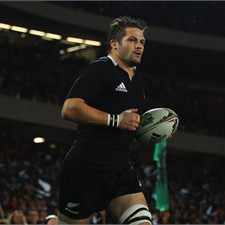Pool A: New Zealand hoping experience counts
Rugby World Cup 2011 favourites New Zealand and two-time finalists France are expected to qualify for the quarter-finals from Pool A and the hosts will be grateful there can be no repeat of the shock defeats by Les Tricolores in the knockout phase that sent the All Blacks home in 1999 and 2007.
If the teams meet again after their Pool A match on 24 September, it would likely be a repeat of the inaugural RWC final in 1987 when New Zealand beat the French 29-9 in Auckland.
John Kirwan, one of the try scorers for New Zealand in that final, will be hoping he can upset the form book as coach of underdogs Japan, who will open their campaign against the French on 10 September, the day after the hosts play Tonga in the tournament opener.
Kirwan is determined the Japanese will have their most successful tournament and has set the Brave Blossoms a target of two Pool A wins, which would gain automatic qualification for RWC 2015 as the third-ranked team.
Japan, who have played in every RWC, ended a run of 13 defeats with a 12-12 draw against Canada at France 2007 and the Canucks, along with Tonga, are Pool A sides Kirwan’s men will be aiming to beat.
New Zealand have selected their most experienced squad in history to break their 24-year wait for a second RWC success. Their players boast 1,137 Tests and nine have more than 50 caps. Captain Richie McCaw and Mils Muliaina (97) are the most capped players in New Zealand history.
McCaw, Muliaina, Daniel Carter, Keven Mealamu and Ali Williams will be playing in their third RWC. A further seven will contest their second tournament. Alongside them, exciting youngsters such as Israel Dagg, Sam Whitelock and Zac Guildford will have their first taste of the big stage.
As in previous RWCs, New Zealand enter the tournament with a formidable record since the last edition and boasting arguably the world’s finest fly half in Carter.
Coach Graham Henry is aware of the weight of expectation from rugby-mad New Zealanders eager to avoid the pain of another premature exit.
“We have been receiving fantastic support from New Zealanders," he said. "We know the country is getting excited, there is a real buzz around, and the players are really looking forward to soaking up the off-field atmosphere.”
Enigmatic France head to New Zealand burdened with the tag of unpredictability. In the past two years under coach Marc Lievremont they have defeated Argentina and New Zealand on foreign soil, and been caned 59-16 by Australia. Defeat by Italy in this year's Six Nations Tournament was a particular lowpoint.
Victories over Ireland in RWC warm-ups might well have put them in the right frame of mind. Led by captain and flanker Thierry Dusautoir, they have a back row to match any in the tournament, even without Sebastien Chabal, the star of 2007.
Lievremont has left behind veteran Sylvain Marconnet, his most experienced forward, but has power and skill up front with the Basque number 8 Imanol Harinordoquy and the reliable Julien Bonnaire.
In the backs, much will be expected from the half-back pairing of Morgan Parra and Francois Trinh-Duc. Les Tricolores lost finals in 1987, against New Zealand, and 1999, against Australia, when Lievremont played in France’s back row.
France possess pace and power in the backs, with the Toulouse pair Vincent Clerc and Maxime Medard offering speed in the back three. Elsewhere, their two 100kg-plus three-quarters, Damien Traille and Aurelien Rougerie, offer a solid response to the physical challenge posed by New Zealand and Tonga.
There are 13 survivors from France’s last RWC campaign, which ended in semi-final defeat by England.
Tonga, who did not have to qualify this year after finishing third in their pool in 2007, are ranked above both Japan and Canada, and will be hoping to match their achievement of four years ago.
They could scarcely have a tougher first match than the 9 September clash against the All Blacks, though they can bank on plenty of support in Auckland with its rich mix of Polynesian residents.
The 30-man squad features several players who performed so admirably in 2007, not only beating USA and Samoa, but performing respectably against finalists England, and coming within five points of eventual champions South Africa.
When they face France in their final group match, they can count on captain Finau Maka for some inside knowledge. The explosive number 8 won the Top 14 and Heineken Cup when he played for Toulouse.
Japan’s coach Kirwan believes he has the squad to unsettle both the Tongans and the Canadians.
“I am very happy with the side,” he said. “We have spent the last four years putting the team together and we have a good mix of youth and experience. We are a much more complete team than four years ago.”
Kirwan’s aim is to be competitive against New Zealand and France and then win the last two.
Takeshi Kikutani will captain a squad of 16 forwards and 14 backs, with Sione Vatuvei the only player who did not feature in the successful HSBC Asian 5 Nations and IRB Pacific Nations Cup campaigns in 2011.
Canada’s coach Kieran Crowley, who also played for New Zealand in the 1987 final, will be aiming to upset his home country and believes he has the squad to do it.
With two confidence-boosting wins over USA in warm-ups, Crowley has 11 veterans of RWC 2007 in his squad, including captain and hooker Pat Riordan, vice captain and fly half Anders Monro and winger DTH van der Merwe.
Only seven members of the squad play club rugby professionally, with the remaining playing in the Canadian Rugby Championship, although the 30-man selection boasts nearly 450 Test caps.
Taylor Paris is the youngest member of the squad at 19, and 35-year-old prop Frank Walsh the oldest.
